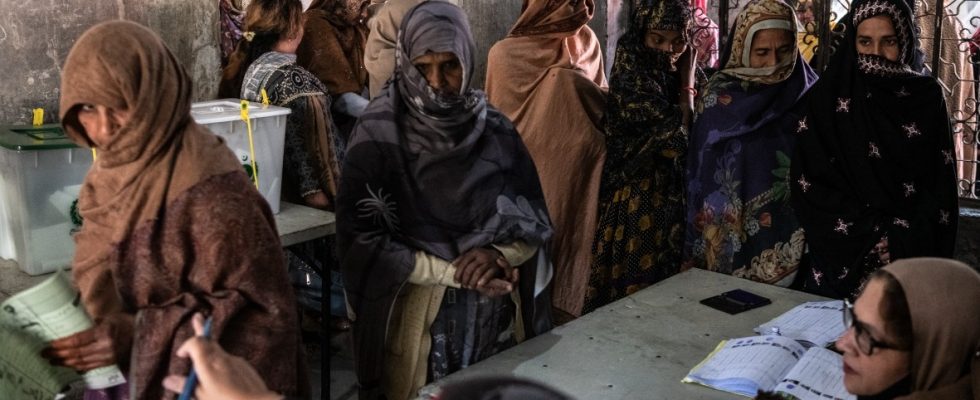Shortly after the polls closed in Islamabad, there was a bang. But it was all the fault of eight young men who were squashed together on three small motorcycles, their exhaust pipes rattling on Fazal-e-haq Road while waving “PTI” flags. PTI stands for the “Pakistan Tehreek-e-Insaf” party of the imprisoned Imran Khan. The former prime minister was hit with a series of charges before the election and is in prison. From there he campaigned. Using artificial intelligence, his followers created videos in which an avatar of Khan gave the speeches he had written. His party was also excluded from taking part. PTI members could only run as independent candidates.
When the results from more than half of the electoral districts were finally announced on Friday afternoon, more than 24 hours after the end of the election, it suddenly looked as if the men with the PTI flags had good reason to celebrate. The candidates supported by Khan had won the most seats after the initial counting. Of the 136 mandates that had been counted by lunchtime, 49 had gone to them so far, as the Pakistan Election Commission told the Reuters news agency.
The fact that this report was made is a good sign that the count is proceeding reasonably cleanly. Because the result poses problems for the election winner Nawaz Sharif, 74, who was supposed to be elected in advance, and the military that supports him. Sharif’s Pakistan Muslim League had won only 42 seats by midday. The “Pakistan Peoples Party” with its leading candidate Bilawal Bhutto Zardari, the son of the murdered former Prime Minister Benazir Bhutto, won 34 seats.
The former hopeful Khan has fallen out with the powerful military
The Pakistani electoral system is extremely complicated. Independent candidates are not allowed to form a government. But you can choose who you want to support after voting. After the heated arguments of the past few months, negotiations are likely to be difficult. Imran Khan, once a beacon of hope, has fallen out with the country’s powerful military. In an unprecedented confrontation, Khan accused the generals of ordering an attack on him. He drove the government of Shebaz Sharif, the brother of Nawaz, into power, with populist attacks.
The crowds that gathered around Khan grew ever larger when he railed against the rulers – against the Sharif and Bhutto families, who, in alternation with the military, have repeatedly secured power in the country over the past decades and the country in had maneuvered the current situation. Pakistan’s economy is stumbling, inflation is currently around 30 percent.
A new package must be negotiated with the International Monetary Fund (IMF) in March. The previous rounds of negotiations under the leadership of Shebaz Sharif and the necessary concessions to the IMF had led to sharp price increases, which particularly affected the many poor people in the country. During his time in office, Khan, however, refused to remove fuel subsidies. How and in what constellation things continue will have a direct impact on the next round of negotiations. The politicians will be sitting there again, while the military will have to deal primarily with the country’s second major problem. To terrorism.
On election day, cell phones were switched off to prevent riots
Zafar Iqbal, secretary of the Election Commission, explained that the election results were announced so late with “internet problems”. In fact, the country’s mobile phone systems were switched off on election day “to maintain public order and counter possible threats,” as the Interior Ministry announced. Nevertheless, there were attacks by militant groups, especially in the border regions with Iran and Afghanistan. 28 people died, including two children.
Around 130 million eligible voters in Pakistan were called on Thursday to elect a new parliament.
(Photo: ABDUL MAJEED/AFP)
Amnesty International called the suspension of mobile phone services “a blatant attack on the rights to freedom of expression and peaceful assembly.” Vedant Patel, deputy spokesman for the US State Department, told reporters in Washington that they were concerned about “steps that have been taken to restrict freedom of expression, particularly with regard to the use of the Internet and mobile phones.”
In the evening, Nawaz Sharif claimed victory and declared that his party had emerged from the vote as the strongest force. He wants to start forming a coalition government. However, he did not announce how many seats his party had won and the final count had not yet been made. At 61, his PML-N was far from the required majority of 133 seats. Sharif said his deputies would meet with leaders of other parties. Khan, however, rejected his rival’s claims in the evening and called on his supporters to celebrate the victory.
On Friday evening, the USA, the EU and Great Britain expressed doubts about the proper conduct of the parliamentary election and called for an investigation.

